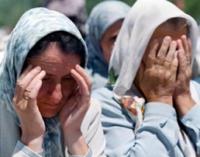
This week marked the ten-year anniversary of the massacres in the Bosnian town of Srebrenica. 13 July 1995 - Dutch peacekeepers hand over 5 000 unarmed Muslims to Serbian forces in exchange for 14 Dutch hostages. Days later, reports stream into news agencies, speculating that upwards of 7 000 Muslim men have been slaughtered by Serbian forces. Srebrenica, once a "United Nations Safe Area", is now a synonym for mass murder.
Eleven years ago this April, an estimated 800 000 Rwandan Tutsis were murdered within 100 days, most of them by machete. My friend John, from Rwanda, survived - but most of his family did not. It was a monumental tragedy that the world stood by and offered apologies after the fact - but you already know that.
One would think that after having witnessed so many of these massacres, we would, as a society, be able to prevent them. One would think that having witnessed the way in which these events tear lives and families to shreds, we would be willing to stand forward, speak boldly and end them.
One would think wrong.
Ten years after Srebrenica, eleven after Rwanda, human rights abuses, massacres and acts of violence and hatred continue to pervade the planet. The best-known example is that of the Sudanese Darfur region - the
janjaweed militias continue to slaughter thousands of innocent people - but the list goes on. Around the world, leaders and governments make statements that simply don't cut it - they play the diplomatic game, but they don't show the moral leadership that we need.
Canadian Prime Minister
Paul Martin:
I remain deeply and personally concerned about the situation in southern Sudan and the crisis in Darfur.
American President
George W Bush:
The world cannot ignore the suffering of more than one million people. The US will continue to help relieve suffering, as we demand that the Jinjaweed disarm, and that the Government, Jinjaweed, and Darfur rebels end the violence.
South African President
Thabo Mbeki:
We are saying that you have got to work with the Sudanese government, for instance, so that it becomes part of the solution; we've got to work with the rebel movements in Darfur so that they become parties to this solution there, so that the outcome we get is a stable political settlement, an end to the violence, a return of all the people of Darfur to their homes and villages. That's what we've got to do.
[...]
If you denounce, let us say, the government of Sudan as genocidal, what's next? Then don't you have to arrest the president? We’re looking for a solution to the problem, and the solution doesn't lie in making radical statements, not for us as Africans.
In most cases, the world's leaders are afraid to stand up and call something what it truly is - they're afraid to stand up and say that something is wrong. Beyond that, they refuse to take action to back up their words. Instead, they want to talk and debate and discuss and involve all parties - even those who are aiding and abetting murder. Don't get me wrong, dialogue and discussion is certainly important. But there comes a point where we must grit our teeth and act. Britain's
Tony Blair perhaps said it best when he told us: "Enough talking - it is now time to do."
Perhaps part of this problem involves the media, who have a tendency of moving on to new topics quickly and leaving old ones in the dust. Can you remember the last newspaper article you read on Darfur? I certainly can't - but the massacres continue.
It's clear to me that this world has lost its moral compass - or at least has forgotten how to follow the directions that it gives. Regardless, on the tenth anniversary of Srebrenica, we should take the opportunity to make a concerted effort to find that voice of conscience again. We need to continue to make this an issue, and make our leaders act. We need to find a way to return the world's moral compass - I'm just not sure how, yet.
Related ReadingTimeline: Siege of Srebrenica (BBC)
Rwanda: How the genocide happened (BBC)
The Wages of Denial (New York Times)
 We all know that Paul Martin likes to take his time in making decisions, and the appointment of Frank McKenna to be Canada's new Ambassador to the United States was no exception. I wasn't sure about McKenna at first, but you have to give the PM credit for breaking a bit with tradition. Sure, he's a Liberal and no doubt close to Mr Martin - but he's no career diplomat. He's a politician, through and through. It could have gone wonderfully or just atrociously.
We all know that Paul Martin likes to take his time in making decisions, and the appointment of Frank McKenna to be Canada's new Ambassador to the United States was no exception. I wasn't sure about McKenna at first, but you have to give the PM credit for breaking a bit with tradition. Sure, he's a Liberal and no doubt close to Mr Martin - but he's no career diplomat. He's a politician, through and through. It could have gone wonderfully or just atrociously.















